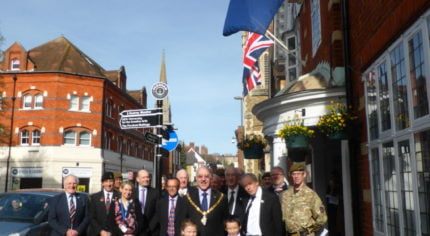A flag-raising ceremony took place on Monday (13 March) at Farnham Town Council to commemorate Commonwealth Day.
Councillor John Ward, the Mayor of Farnham welcomed guests and read a short message from HM The Queen. Speaking about Commonwealth Day, Councillor John Ward said: “Commonwealth Day is an opportunity to promote the Commonwealth’s shared values of peace, democracy and equality, and to celebrate the rich diversity of the Commonwealth’s 52 member countries.
“2017 marks 40 years since Commonwealth Day became a global celebration, which is marked every year on the second Monday in March. Our ceremony in Farnham was matched by ceremonies, services and flag displays across the towns and cities of the United Kingdom, as well as in many great cities across the Commonwealth. All these events are a reminder of our common family purpose, of what we can achieve together and of the goals which, in the interests of all humanity, we must now strive.”
The Mayor’s welcome was followed by the reading of the Commonwealth Affirmation by Councillor Mike Hodge, the Deputy Mayor of Farnham.
At 10am, the Commonwealth flag was unfurled by the Mayor of Farnham, Councillor John Ward with assistance from two students from Waverley Abbey School.
After the flag-raising, the guests proceeded to the war memorial at Gostrey Meadow where they joined representatives from the Princess of Wales’s Royal Regiment and the Royal British Legion. The importance of the Single Commemorative Act was ready by Tony Hooper from the Royal British Legion.
It describes how ‘Commonwealth Day provides an opportunity to remember the sacrifices of the Indian army in the battle of Neuve Chapelle, the anniversary of which falls close to Commonwealth Day. It is also an opportunity to remember the Caribbean soldiers who fought in the Middle East, Africa and Europe. It is also a time to remember the brave Anzacs at Gallipoli, the heroism of the Canadians at Passchendale which was a major battle in 1917 and the vital contributions from African contingents in many theatres of war’.
The ceremony concluded with the lighting of a candle by Josese Tunidau from the Princess of Wales’s Royal Regiment. This simple act provided a moment to remember the contribution made by three million men and women from the Commonwealth who volunteered in World War I and to commemorate the 1.1 million Commonwealth soldiers who lost their lives.



